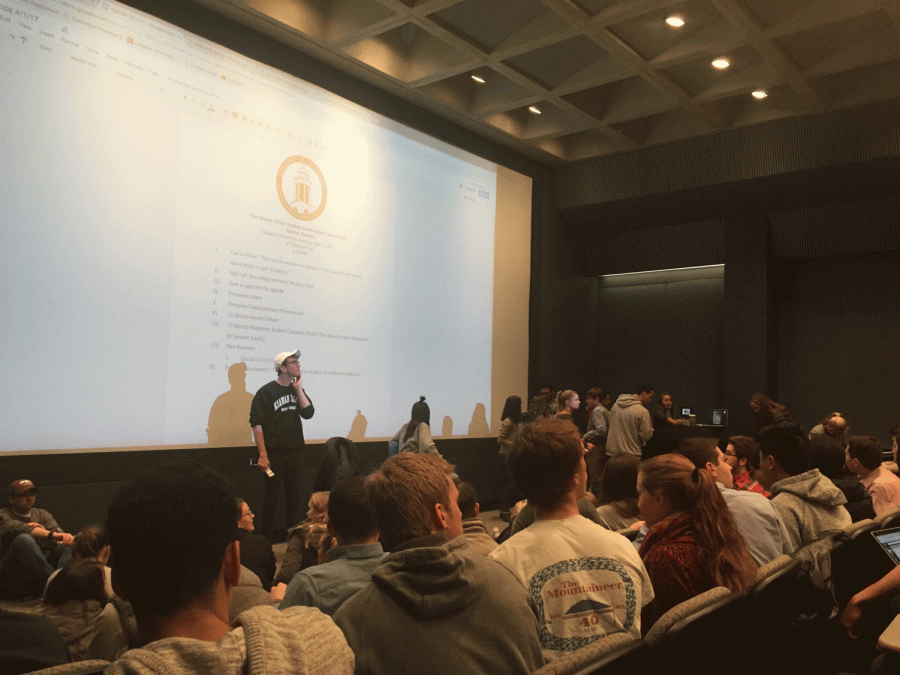SGA Election Redirected After Alleged Assaults at Fraternity are Publicized
SGA holds an emergency meeting to discuss possible changes to the bylaws in light of candidate’s proposed resignation.
On Saturday, April 1, at 4:30 p.m., the Leadership of the Student Government Association (SGA) held an emergency meeting to discuss a potential bill that would amend campaign rules in the wake of vice presidential candidate junior Coles Romaine’s resignation. Juniors Hyeon Jeong and Romaine were originally running for the positions of SGA President and Vice President against juniors Derek Baker and Marie St. Claire. However, Romaine announced that he intended to resign from the campaign, so the SGA called for a meeting to decide whether or not to pass an amendment that would allow Jeong to continue his campaign with another student filling in Romaine’s place. After a straw poll of the audience, the Senate decided against the amendment, with eight votes in favor of the amendment, 21 against it and three abstentions.
According to an SGA email, the meeting was called “to discuss how to proceed with the election in light of events that led to a candidate’s resignation.”
The SGA meeting began several minutes after a campus-wide email from Interim Vice President and Dean of the College Mark Thompson alerted members of the Colgate community of two alleged sexual assaults that occurred at Beta Theta Pi fraternity.
The Jeong and Romaine campaign team acknowledged that because of Romaine’s membership in Beta Theta Pi, his vice presidency would, among other things, silence survivors.
“Men in Greek Life are representative of an oppressive and damaging system,” Jeong and Romaine’s campaign team member Andrew Vallejos said.
Students were notified of the incident via a campus alert that specified the alleged assaults occurred at Beta Theta Pi’s fraternity house. Thompson’s email was sent to all students on campus.
“Within the last 24 hours, we have received reports of two alleged sexual assaults that occurred during the previous week; the first on Monday, March 27 and the other on Thursday, March 30. Reports indicated that both assaults occurred at 88 Broad Street, the Beta Theta Pi fraternity house,” Thompson stated in the email sent out on April 1.
In the past week, Thompson followed this with another email addressing the issue of sexual violence on campus and providing links to resources for individuals who have been impacted by sexual violence. Additionally, Thompson’s email included links to outlets through which individuals can provide any information they may have to assist in the investigation of these allegations.
The SGA meeting was held to address whether or not campaign rules should be changed to allow another student to replace Romaine on the ballot. Non-SGA students crowded along the walls of Golden Auditorium as Speaker of the Senate, sophomore Jenny Lundt, took to the podium to remind the audience of the sensitivity of the issue at hand.
“We’re speaking about a real person on campus,” Lundt said, referring to the weight of the topic being addressed.
SGA Diversity Coordinator Jon Williams announced trigger warnings for sexual assault and sexual violence.
The Election Commissioners, seniors Sid Wadhera and OT Tang, presented the bylaw amendment that would allow election commissioners to change the handbook during the campaign period. Wadhera expressed hesitation towards delaying the voting period. He thought that extending the campaign season could hurt the well-being of the campaign teams, particularly as finals week looms.
According to Wahera, the proposed changes to the SGA bylaws are not without consequence.
“The changes outlined are not setting a new precedent, but are making leeway to delegitimize the democratic system this university already has,” Wadhera said.
Attendees sidelined the bylaw debate in favor of questions surrounding SGA transparency, campus-wide accountability and sexual assault. Senators on both campaign teams, as well as non-SGA affiliates, expressed apprehension that the reality of sexual assault could become politicized.
“The tragic assault of a woman on this campus should not be exploited for political gain,” Senator and sophomore Faith Hamlin said. She called on fellow senators to “remove ourselves from this discourse that surrounds itself around the campaign, but not the greater issue of sexual assault on campus.”
Sophomore Hannah Chenok similarly urged attendees to put politics aside.
“[We should] stand in solidarity with the survivor and not let [the politics] be divisive. Make sure that we’re entirely behind them and not let any of this political stuff bog us down,” Chenok said.
An applause of snaps ensued.
The conversation then turned to SGA transparency, as one student suggested senators raise their hand while they voted electronically via clicker. Lundt also encouraged this practice.
But, the majority of the crowd was not senators, and deliberation on bylaws faded as students voiced their concerns about the severity and frequency of sexual assaults on Colgate’s campus. Vallejos reminded the crowd that, although these circumstances might seem out of the ordinary given the backdrop of the SGA presidential campaign, this is not the case.
“Sexual assault in fraternities is not unprecedented,” Vallejos said.
Other students expressed similar sentiments, fearing a lack of open dialogue would brush the issue under the rug and compound the problem. Participants of the moderated caucus expressed a desire for heightened accountability for perpetrators of sexual assault, as speakers called on their peers to take action within their Colgate communities to combat these issues.
While students were in favor of the logistical outcome, many left the meeting feeling the opportunity for productive conversation had been squandered.
SGA President senior Matt Swain echoed concerns about the SGA-centric tone of the meeting.
“We have a broader and more significant issue here, and while it’s wonderful to see so many people at the event today, I hope that it was not just about this election but about a greater problem we are facing as a community,” Swain said.
Swain’s hopes were realized, as several individuals attributed their attendance at the meeting to the recent sexual assault allegations, rather than the logistics of the SGA election.
“Sure the meeting was supposed to be about replacing Coles, but that’s the smallest issue,” junior Jonathan Burton said. “Everyone was there to talk about what happened, and SGA made it about themselves.”
First-year Madison Heggins was not initially optimistic about the way that this issue was addressed.
“I was kind of a little put off by SGA, just because I didn’t think they were really listening,” Heggins said. “They were very vocal about saying how this was more than a political issue, but it didn’t seem like they meant it.”
Junior Sydni Bond called on the SGA as campus leaders to have a more survivor-centric dialogue on sexual assault.
“I do kind of wish that all of the [campaign members] had been here throughout the whole entire thing,” Bond said. “I think it’s inexcusable that some of them showed up towards the end.”
Voting for next year’s SGA President and Vice President began early on the morning of Monday, April 3 and will continue until Thursday, April 6 at 11:59 p.m. Students can either vote for running mates Baker and St. Claire or submit a vote of no confidence. Results of this year’s election will be decided by the end of this week.
While the question of a bylaw change was answered at this meeting, the dialogue on sexual assault continues on campus.
Editor’s Note: The second email from Dean Thompson, sent out on April 3, noted that the alleged assaults occurred “at or in association with 88 Broad Street, the Beta Theta Pi fraternity house.”












